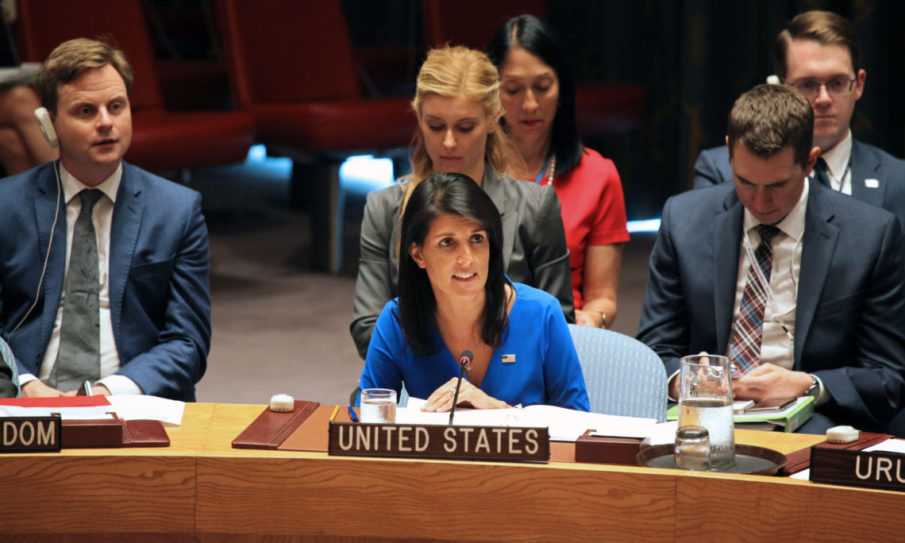America’s ambassador to the United Nations, Nikki Haley, did not mince words in an emergency security council meeting held on Monday, saying “the time for half measures” with North Korea had come to an end.
Over the weekend, Kim’s regime successfully tested what is believed to be a two-stage thermonuclear weapon, or hydrogen bomb. This new design, which North Korea claims is already mountable on their long-range ballistic missiles, could potentially have ten times the destructive power of previous North Korean nukes – elevating them to the status of entire city killers, and opening up more options for a large-scale electromagnetic pulse (EMP) attack on the mainland United States.
“Enough is enough,” Haley said. “We have taken an incremental approach, and despite the best of intentions, it has not worked.”
The United Nations, as well as the U.S., have levied sanction after sanction, as well as multiple resolutions intended to hinder Kim’s nuclear ambitions, and Sunday’s hydrogen bomb test clearly indicated, according to Haley, the failure of the current status quo.
“War is never something the Unites States wants — we don’t want it now,” Haley said. “But our country’s patience is not unlimited. We will defend our allies and our territory.”
The United States is currently drafting yet another UN resolution that they intend to begin circulating in the security council immediately, to be voted upon sometime next week. Haley did not reveal any of the details that might be included in the resolution, but South Korea’s ambassador Cho Tae-yul chimed in to say that this latest bit of paperwork needs to be “truly biting.”
Now is the time to take measures that are strong and robust enough to compel North Korea to seriously engage in dialogue,” he said. “The new resolution must include not only additional measures to further block funds that could possibly flow into North Korea’s illegal nuclear program, but also truly biting and robust measures that Pyongyang finds very painful.”
This resolution will likely see strong support from a number of America’s allies, but could potentially be vetoed by Russia.
Vladimir Putin went on record earlier this week saying that “Russia believes that the policy of putting pressure on Pyongyang to stop its nuclear missile program is misguided and futile.” This statement likely came as no surprise to diplomats that have been working to quell the rising tensions on the Korean peninsula, as Russia and China have both actively worked to shift perceptions of the diplomatic strife between nations to paint America as the aggressor, rather than the peacekeeper.
With little room to criticize the U.S. for North Korea’s latest nuclear test, China did call on North Korea to stop such provocations, but quickly tempered their statement by making it clear that they would not tolerate American taking military action to stop it on their own terms.
We strongly urge the DPRK to face up squarely to the firm will of the international community on the issue of the denuclearization of the peninsula and earnestly abide by the relevant resolutions of the council.” Chinese Ambassador to the UN Liu Jieyi said. “The peninsula issue must be resolved peacefully. China will never allow chaos and war on the peninsula.”
Already have an account? Sign In
Two ways to continue to read this article.
Subscribe
$1.99
every 4 weeks
- Unlimited access to all articles
- Support independent journalism
- Ad-free reading experience
Subscribe Now
Recurring Monthly. Cancel Anytime.
China and Russia both touted their plans for a “suspension for suspension” agreement between North Korea and the United States – wherein the U.S. would cease its joint military exercises near the North Korean border in exchange for an end to North Korea missile tests and nuclear pursuits. The United States, who had to take military action earlier this year in response to Bashar al Assad’s use of chemical weapons in Syria after a Russian-led initiative claimed to remove all such weapons from the Syrian nation, made it clear that they won’t be fooled by such theatrics again.
The idea that some have suggested a so-called ‘freeze for freeze’ is insulting,” she said. “When a rogue regime has a nuclear weapon and an ICBM pointed at you, you do not take steps to lower your guard. No one would do that. We certainly won’t.”
China and Russia have both claimed to enforce UN sanctions against North Korea, while both nations have seen a marked increase in non-military trade with Kim’s regime since tensions began to rise.
“What is definitely unacceptable to us is that on the one hand we work so hard to peacefully resolve this issue and on the other hand our interests are subject to sanctions and jeopardized,” Chinese Foreign Ministry spokesman Geng Shuang said at a news briefing. “This is unfair.”
China not only increased trade with North Korea over the past year, but also provided Kim’s regime with six large timber trucks that were promptly converted into ICBM carriers for North Korea’s Hwasong-14 missile. Making these platforms mobile has made them far more difficult to locate and destroy before they are able to launch. China claimed that they had no idea North Korea would use those trucks for any such purpose.
Haley, who has demonstrated herself to be a strong speaker and firm diplomat in the months since her appointment by President Trump, concluded by calling on the UN to solidify the strongest possible sanctions against Kim’s regime.
“We’ve kicked the can down the road long enough,” Haley said. “There is no more road left.”
Image courtesy of the U.S. State Dept.










COMMENTS